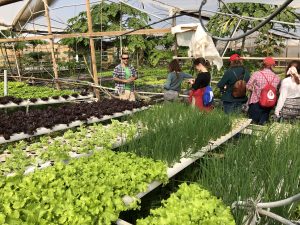Wow what an amazing day. We’ve had many good ones but today was really special – everything came together nicely and there were many highlights.
After a quiet night in the Beit She’An hostel, a few of us woke up before dawn to bushwhack down to a nearby stream or to go for a run. The stream group enjoyed a cool dawn hike through an old cemetery and green goat pastures to the Harod stream. On the way down we saw some migratory birds flying overhead, then were treated to the happy sound of cold rushing water. The real surprise was accidentally bumbling into the open back gate of Beit She’An National Park, where we found the ruins of a 2000 year-old Roman bridge over the creek, with 30 foot tall arches set in a peaceful spot among the stones and greenery of the valley bottom. The group that went for a jog did not make out as well but they made it home in one piece and in time for a hearty breakfast.
For our morning tour, we drove to the Kibbutz village of Hukuk, nestled in the hills above the Sea of Galilee. The weather was fine and we had a great view of Israel’s largest body of fresh water and the surrounding banana and mango plantations. Our destination was the LivinGreen hydroponic farm (https://livingreenglobal.com/) where we spent a few precious hours with the farm manager Tiran. Tiran is a self-described crazy genius with boundless energy and a passion for growing better food through applied Biology. Highlights of the tour included the organic hydroponic system and a production-scale aquaponic system where water from a large fish tank is cleaned by transferring its nutrients to beds of leafy greens, lettuces, herbs and papaya trees. LivinGreen is truly on the cutting edge of sustainable food production in Israel and beyond. Tiran shared his passion for high quality food production and soulful business development with the students, who were duly impressed. We also enjoyed watching his adorable pair of Jack Russel terriers play and fight amongst the crops.
After filling our minds with hydroponic inspiration, it was time to fill our bellies with some wholesome food. Tiran directed us to Yoffee Coffee (beautiful coffee in Hebrew), a nearby restaurant that buys produce from his farm. The lunch feast was another trip highlight – vegan and vegetarian Kosher food made from fresh, local ingredients. My personal favorites were grilled eggplant rolled around seasoned cheese in tomato sauce and hearty bread warm from the oven, but there were really too many good dishes to pick the best one. Eating this delicious meal fresh from the farm was a great way to complete our tour.
From Yoffee Coffee it was a short drive through strikingly beautiful mountainous terrain to the vineyards at Kibbutz Tzivon near the base of Mt. Meron. Tzivon is a secular ecological kibbutz with grape and fruit production among its endeavors. The community is committed to sustainable living practices and encourages low-impact lifestyles among its members (for more info visit https://translate.google.com/translate?hl=en&sl=iw&u=http://tzivon.com/&prev=search). Our tour was hosted by Ido, the vineyard manager. Ido brought a table with white tablecloth out to the field amongst the grape vines, where he served coffee, dried pineapple and local nuts. It was elegant and welcome in the cool mountain air, though sadly a few of the group accidentally put salt in their coffees!
In his endearing South African/Australian accented English, Ido calmly but thoroughly explained his deep approach to organic and biodynamic grape production. He builds and maintains fertility on the vulnerable mountain soils by allowing naturally occurring grasses and herbs to grow up among the vines. Rather than mowing or tilling these into the soil, he rolls them down into an in-situ mulch using specialized equipment he developed for that purpose. The mulch keeps the soil cool while reducing erosion and fungal diseases among the grapes. Once every seven years, the farm allows livestock and wild animals to graze the grasses down to the soil surface in order to rejuvenate the land. Ido also shared his approach to pruning grape vines to improve their health, performance and energy flow. It was especially impressive to see the contrast between the original vineyard, with 14 year-old vines, and a newly established vineyard further down the hill. The care and effort that Ido and his co-workers put into the old vineyard were clearly evident in the deep soil and healthy mature vines. For more information or to find wines made from Tzivon grapes, find them on Facebook at כרמי קיבוץ צבעון (Kerem Kibbutz Tzivon).
Finally we wrapped up the day in Pki’in, a Druze village in the mountains between Tzivon and our next destination near the coast. Our in-country guide Nairooz taught everyone a few greetings in Arabic so we could attempt to be polite to our hosts at dinner. A local Druze family welcomed us to their restaurant, where the students helped to make “makruba” which means upside-down and is prepared by layering ingredients in a large pot, with rice on top, then turned out onto a plate after cooking. Everything was delicious – including the unique paper-thin bread characteristic of Druze communities – and we all enjoyed a relaxed meal over light conversation.
This short post doesn’t do justice to the depth of agricultural knowledge and dedication shared with us today by two very different presenters at their beautiful farms. What a day!
לילה טוב and تصبح على خير
Thanks for reading.
MS

